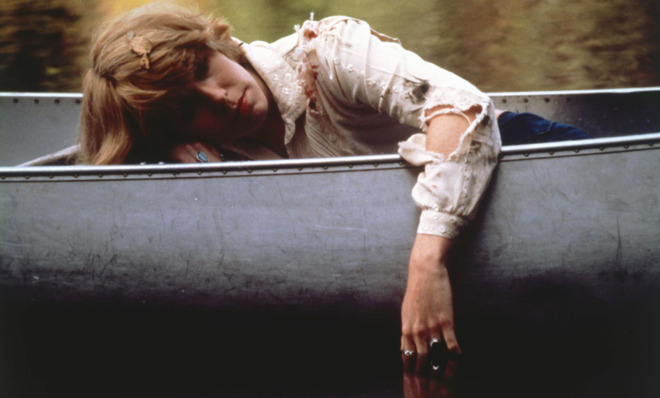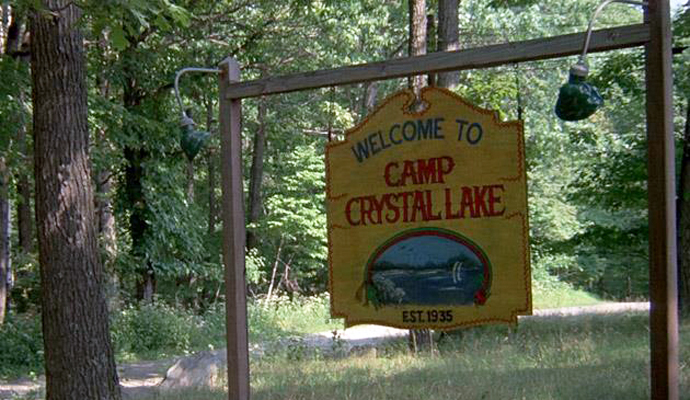How Friday the 13th accidentally perfected the slasher movie
A look back at the first installment in one of horror's most enduring franchises


If you compiled a list of the most scathing reviews in cinema history, Gene Siskel's blistering takedown of the 1980 slasher Friday the 13th would probably top the list. "It has been suggested to me that a great way to keep people from seeing a truly awful movie is to tell them the ending," he wrote. "I like that idea a lot, and I know it is a powerful (and controversial) weapon. So you're going to have to trust me to use it wisely… and sparingly."
In the paragraphs that follow, Siskel reveals the entire third act of Friday the 13th — spoiling the identity and motive of the killer, and describing her ultimate demise. "Now there," he wrote. "I hope I've ruined Friday the 13th, which is the latest film by one of the most despicable creatures ever to infest the movie business, Sean S. Cunningham."
Decades later, Cunningham took issue with at least one part of Siskel's review. "The person who calls Friday the 13th a 'film' is pretentious," said Cunningham. "This is the movie business we're involved in. And there is a difference."
The Week
Escape your echo chamber. Get the facts behind the news, plus analysis from multiple perspectives.

Sign up for The Week's Free Newsletters
From our morning news briefing to a weekly Good News Newsletter, get the best of The Week delivered directly to your inbox.
From our morning news briefing to a weekly Good News Newsletter, get the best of The Week delivered directly to your inbox.
Even now — in an era where pretty much any successful movie is treated as a possible franchise — Friday the 13th rises far above the curve: 10 sequels, one reboot (with another on the way), one TV show (with another on the way), comic books, a video game, and countless trick-or-treaters with hockey masks and plastic machetes.
But before it became an absurdly prolific franchise, Friday the 13th was a cynical, one-off attempt to make a fast buck on a sleazy slasher movie that accidentally ended up spawning a decades-spanning, multimillion-dollar phenomenon.
"I had this movie title banging around in the back of my head that I thought would be terrific: Friday the 13th," recalled Sean S. Cunningham in Crystal Lake Memories: The Complete History of Friday the 13th. "I had no idea what the movie would be, but with that title I thought, at least, I'd be off to a good start." On the advice of friend and collaborator Steve Miner, Cunningham pulled a classic huckster movie: wildly over-promising before there was any movie to deliver.
The duo bought a full-page ad in Variety proclaiming that Friday the 13th would be "the most terrifying film ever made" before they had a script to film, the money to make it, or even the rights to the title. From there, it was just a matter of pinning down the details. Screenwriter Victor Miller and Cunningham came up with 50-odd venues that might work — amusement parks, high schools, playgrounds, "anywhere that kids would be" — before settling on a summer camp.
A free daily email with the biggest news stories of the day – and the best features from TheWeek.com

Friday the 13th opens with a title card that reads "FRIDAY, JUNE 13. THE PRESENT," but it's not exactly a timeless movie. Short shorts and feathered hair are everywhere. One teen does a giddy Katherine Hepburn impression in the mirror shortly before she gets killed. "What you been smoking, boy?" says a police officer name Dorf (who is not, alas, played by Tim Conway). "Colombian gold, man. Hash, grass, the weed. Dig it?" There's even an extended game of strip Monopoly. A clever editor could probably swap in some new music and recut Friday the 13th as a teen sex romp along the lines of Meatballs or Gorp.
Unfortunately, all that fun is cut short by a mysterious maniac who is bent on dispatching every teenager who took a job at Camp Crystal Lake. One by one, the teens are picked off: a knife in the stomach, an arrow through the eye, an axe in the face. (Most notably, the victims' ranks include Kevin Bacon, fresh off the success of Animal House, who has an arrow stabbed through the neck shortly after sleeping with a fellow counselor.)
If that sounds formulaic to you, it's probably because Friday the 13th was consciously designed to follow a formula. The filmmakers literally reverse-engineered 1978's Halloween, which had grossed $47 million on a $325,000 budget, to come up with their own variation. "Basically you start with a prior evil that happens before the movie opens," explained screenwriter Victor Miller at a reunion event in 2009. "You have a bunch of randy teenagers who are outside the help of formal authority. Adults cannot come to save their asses. And you knock them off one by one. Especially the ones who fornicate. And at the end, the evil genius is found."
Despite the controversy over its adult content — which according to Gene Siskel, should have merited an "X" rating — Friday the 13th is exceedingly tame by modern standards (and by the standards of later entries in the franchise). There's almost no nudity, and several characters are discovered after they've already been murdered, sparing the audience (and the effects budget) from graphic scenes involving stabbing or impaling.
But murdered teenagers aside, Friday the 13th bears little resemblance to the franchise it spawned. Most notably (and famously), Jason is almost entirely absent from Friday the 13th. He appears only at the very end, as a final jump-scare — still effective today — that was originally intended as a dream sequence:

Instead, the villain turns out to be his mother, Mrs. Vorhees. Unlike Jason's single-mindedness, Mrs. Vorhees actually has two agendas for the murders she commits. One: she wants to kill the negligent Camp Crystal Lake counselors, whom she holds responsible for the drowning of her adolescent son. Two: she wants to cause enough chaos to keep the camp from reopening, which might put more children in danger. Her goal is almost noble — based on what we see before the killing starts, you probably wouldn't want these counselors watching your kids.
What's most striking about Friday the 13th is how little regard anyone but its fans seem to have for it. It's not just critics; in the years since its release, almost everyone involved in the production of Friday the 13th has found time to bash it. Screenwriter Victor Miller recalled the genesis of his involvement with the movie — a phone call with Sean Cunningham that began, "Halloween is making a lot of money at the box office. Why don't we rip it off?" (He also said the film's final jump scare was "as close as I could steal from Carrie without being arrested.") Star Adrienne King described her successful audition for the role of Alice: "It wasn't even a scene, it was just 'Hello, here's my picture. I'm young and nubile and I can scream very well.'" 34 years and 10 sequels later, Sean Cunningham still seems baffled by the success of Friday the 13th: "The movie has no emotional impact on me at all. The characters were thin at best."
So why did it make such a splash? Theories abound, but here's mine: Friday the 13th succeeded because it was brazen enough to steal so many tricks from the many brilliant horror films that came before it. In addition to Halloween and Carrie, the filmmakers have cited Psycho and Jaws as key influences on Friday the 13th's production, and the "homages" aren't exactly subtle. But by taking some of Hollywood's all-time great horror movies and throwing them into a blender, Friday the 13th accidentally created the no-frills, platonic ideal of the slasher movie, and its modest pleasures have only grown more potent in comparison to the scores of slipshod knockoffs it inspired. Films are great — but sometimes, audiences just want a movie.
Scott Meslow is the entertainment editor for TheWeek.com. He has written about film and television at publications including The Atlantic, POLITICO Magazine, and Vulture.
-
 Will SpaceX, OpenAI and Anthropic make 2026 the year of mega tech listings?
Will SpaceX, OpenAI and Anthropic make 2026 the year of mega tech listings?In Depth SpaceX float may come as soon as this year, and would be the largest IPO in history
-
 Reforming the House of Lords
Reforming the House of LordsThe Explainer Keir Starmer’s government regards reform of the House of Lords as ‘long overdue and essential’
-
 Sudoku: February 2026
Sudoku: February 2026Puzzles The daily medium sudoku puzzle from The Week
